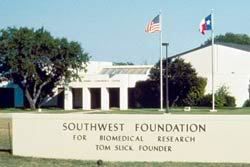Top-level biolabs in Texas, Georgia lack proper security
The Government Accountability Office has found two of the five U.S. labs that conduct research on some of the world's deadliest germs come up short on security.
 Though the GAO report (pdf) released last week did not name the troubled Biosafety Level 4 facilities, the Associated Press identified them as the Southwest Foundation for Biomedical Security in San Antonio and Georgia State University in Atlanta:
Though the GAO report (pdf) released last week did not name the troubled Biosafety Level 4 facilities, the Associated Press identified them as the Southwest Foundation for Biomedical Security in San Antonio and Georgia State University in Atlanta:
The GAO, Congress' investigative and auditing arm, did not identify the labs except to say they were classified as Biosafety Level 4 facilities, but the report included enough details for the AP -- and others knowledgeable about such labs -- to determine their locations.
The San Antonio lab has an outside window that looks directly into the room where the dangerous pathogens are handled. It also lacks adequate security cameras, intrusion detection alarms and visible armed guards at public entrances. The lab at Georgia State lacks complete security barriers as well as live monitoring by security cameras, and GAO investigators watched an unidentified pedestrian enter the facility through an unguarded loading dock. The labs handle pathogens for which there are no treatments or vaccines, including the deadly Ebola virus.
The federal Centers for Disease Control and Prevention, which regulates BSL-4 labs, approved the San Antonio and Georgia State facilities to handle dangerous germs despite their security shortcomings.
The GAO report found adequate security at the nation's three other BSL-4 labs: the CDC's own facility in Atlanta; the Army's lab at Fort Detrick, Md.; and the University of Texas Medical Branch in Galveston. The Galveston lab was impacted by flooding from Hurricane Ike last month, but the pathogens were reportedly secured before the storm hit.
Last October, the Associated Press reported that U.S. laboratories working with deadly germs have experienced more than 100 accidents and missing shipments since 2003 -- and that number is increasing as more labs take on biodefense work.
Tags
Sue Sturgis
Sue is the former editorial director of Facing South and the Institute for Southern Studies.
